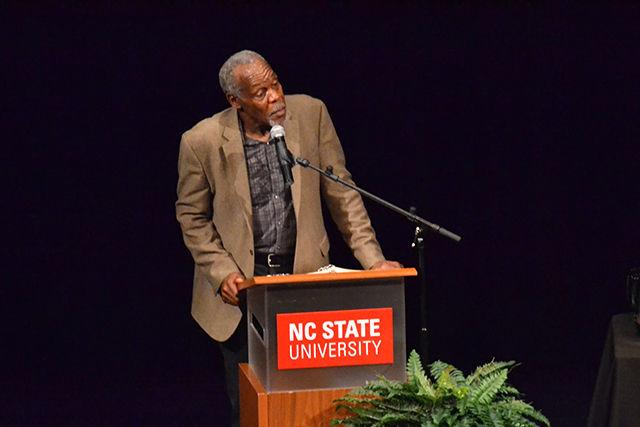
Sindy Huang
Danny Glover, an American actor, film director and political activist, portrays Langton Hughes through a series of poems on Sept. 16 during An Evening with Martin and Langston in Stewart Theater in Talley Student Union. This event was a part of Experiencing King at NC State, a weekend that aimed to illustrate the impact made by King during America's Civil Rights Movement.
Stewart Theatre at Talley Student Union echoed the familiar words of Martin Luther King Jr. and Langston Hughes last Friday. The audience relived the 20th century’s most passionate orators through haunting renditions. Actors Danny Glover and Felix Justice made an appearance at the event, created through a partnership with NCSU Libraries, the College of Humanities and Social Sciences, the African American Cultural Center and NC State Live. People were encouraged to arrive early to attend a preshow talk in the Coastal Ballroom at 7 p.m. conducted by English professor Jason Miller, who led the weekend events.
Miller’s talk encompassed his work concerning King and Hughes, such as “Origins of the Dream” and “Kings First Dream,” his effort in the audio preservation and restoration of an early version of the monumental “I Have A Dream” speech. Nine months before his speech in Washington on Nov. 27, 1962, King delivered a rendition in Rocky Mount, North Carolina, in the gymnasium of Booker T. Washington high school.
“The speech in Rocky Mount — it’s kind of unsettling — is actually more complete, more thorough and more in context of what the message of the Dream was,” Miller said in a Q&A after the talk. “It’s very, very interesting. The one delivered at the March of Washington has eight lines of ‘I Have A Dream’ and its key measurement difference is that at that time he says ‘my four children’ because he’d had another child since.”
Insight into the discrete relationship between King and Hughes was provided as well, as Miller explains how King drew on Hughes’ poem “I Dream A World” in the poetry that is recognized when King repeats the memorable “I Have A Dream”.
Developing its foundation in a long history of friendship, the critically acclaimed performance of Glover and Justice has been showcased on many college campuses.
The night began with Justice taking the podium and delivering his own stunning rendition of King’s speech, “Beyond Vietnam,” in which he reinforced his opposition to the Vietnam War in 1968. Justice captured the tone and essence of King excellently, with his booming, direct voice keeping the audience in a cathedral silence as if King himself was speaking.
“I’d like to restrict my remarks tonight to the ways that this war is tearing at the fabric of the American dream,” Justice said.
He goes on to say that well-intentioned people have questioned his acts and asked him why he talks about the war and what it has to do with civil rights. They’ve told him to leave the war to the government and the military, and to stay with his area of expertise.
“It seems strange indeed that I should have spoken out so insistently against the use of violence in solution to our problems here in America, only to turn around and endorse the use of violence in Vietnam,” Justice said. “It seems odd and hypocritical to me that I could preach against racial segregation here at home, only to end up by segregating my own conscience by remaining silent on a war that I regard as wasteful, illegal and immoral.”
Justice vehemently asserts King’s criticisms of the United States in Vietnam, such as the allocation of funds to military spending rather than to programs proposed to help poor Americans in 1968. Among this, King spoke out against the fact that in proportion to their populations, twice as many black men were in combat as white men and proportionally twice as many were being killed in action. Justice then finally makes King’s point of the inherent irony of the war: sending black men to secure liberties in Vietnam that they themselves were not accorded in America and seeing black and white men fight and die together on television for a nation that was unable to seat them together in the same classroom.
After a powerful roar of applause for Justice and his unforgettable performance as King, he introduces “his old friend” to the audience. Entering the spotlight, Glover sings and laughs like the legendary Harlem Renaissance writer.
Glover begins with a partial recitation of Hughes’ poem, “The Weary Blues,” part of which is sung by a black man as told by the narrator and Glover actually sings, “I got the Weary Blues/And I can’t be satisfied/Got the Weary Blues/And can’t be satisfied—/I ain’t happy no mo’/And I wish that I had died.”
Glover then recites Hughes’ poem, “Hope for Harlem,” at the end of which he sings the first two lines of the part of “The Weary Blues,” which he does spontaneously throughout the duration of the performance. While Justice’s portrayal of King was serious and uniform in tone, Glover carried an informal, storytelling tone, characterized by speaking slowly and poetically, whispering and yelling while in character and speaking close to the microphone, reciting Hughes’ poems one after another with only a few brief pauses.
The poem “I Dream A World” by Hughes was presented last in accordance to King’s central message of the dream. Before receiving a standing ovation and returning to his life as Glover, he recites the last line, “Of such I dream, my world!” and then adds two more, “Of such I dream, your world/Of such I dream, our world!” This concluded the performance for the evening and left the audience with a clear message: and of such we dream, our world.